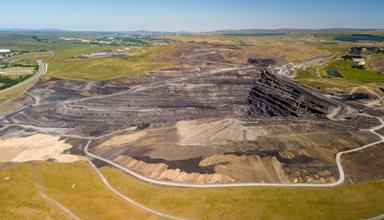On Thursday 13 July 2017, the Research Service and the Learned Society of Wales are hosting an Exchanging Ideas Seminar on the role of renewables in Wales’ future energy mix.
The event will be chaired by Jenny Rathbone AM, a member of the Assembly’s Climate Change, Environment and Rural Affairs Committee and the Cross Party Group on Sustainable Energy.
The seminar, which is open to the public and free to attend, will take place in the Main Hall of the Pierhead in Cardiff Bay between 12:00 – 13:30. Visit the Eventbrite page for further information and to register.
Renewables and the transition to a smarter, more secure, low carbon energy future
In March 2016, the Environment and Sustainability Committee of the Fourth Assembly published its report into A Smarter Energy Future for Wales. The report highlighted the need for a joined up, strategic vision for energy in Wales; and for a holistic approach to policy where Wales’ energy needs are taken into consideration across all policy developments. The Committee recommended that Wales must:
Aim to meet all of its energy needs from renewable sources and, in the context of the need to reduce carbon emissions by at least 80% by 2050, set a target date for achieving this.
The Welsh Government accepted this recommendation in principle in its response to the report (PDF 267KB), stating that it will “model the costs and impacts of meeting the energy needs of a more prosperous and efficient Wales from solely renewable resources”.
In its Programme for Government Taking Wales Forward, the Welsh Government committed to, “support the development of more renewable energy projects, including tidal lagoons and community energy schemes”. The Cabinet Secretary for Environment and Rural Affairs has subsequently outlined the Welsh Government’s energy priorities in an oral statement on 6 December 2016. On reducing reliance on fossil fuels, she outlined the Welsh Government’s intention to focus on transitioning to a low carbon energy future through a range of different technologies (including nuclear) across a range of scales, from community schemes to major projects.
What aspect of energy policy will the seminar explore?
In the context of the need to decarbonise the energy system and reduce carbon emissions by at least 80% by 2050, as required under the Environment (Wales) Act 2016, the seminar will consider the feasibility of, and challenges around, aiming to meet all of Wales’ energy needs from renewables. Key questions that will be addressed on the day include:
- How ambitious the Welsh Government should be in defining the role of renewables in Wales’ future energy mix;
- What the main challenges facing the sector are and whether there is a need for greater certainty around funding and policy;
- Whether there is a case for alternative energy sources (e.g. small modular nuclear reactors and/or unconventional gases) to play a role in Wales’ energy mix; and
- Whether any changes to existing distribution and supply networks are required to enable supply and demand matching.
These questions will be considered in the context of the governmental leadership required to deliver a transformational shift towards a low carbon future.
Who will be speaking at the seminar?
The running order of our speakers will be: Dr Nina Skorupska CBE has over 30 years of experience of working in the Energy Industry. She joined the Renewable Energy Association in July 2013 as its Chief Executive Officer and was awarded the Commander of the Order of the British Empire (CBE) in the 2016 New Year's Honours List for her contribution to Renewables and Equality in Energy: She says:
The [renewables] industry itself is undergoing radical change. We are seeing a fundamental shift in the business and technology. We are seeing new players such as corporate businesses and local government, stepping up to champion quite radical low carbon energy delivery models, “energised” by the prospects of reducing costs and development of smart energy.
All of this is underlined with falling technology costs and increased investment. There is no denying that renewable energy and clean tech is one of the fastest growing industries in the world.
Professor Max Munday is Director of the Welsh Economy Research Unit at Cardiff Business School and a Deputy Director of the Cardiff University Water Research Institute. He has interests in regional economics, tourism economics, and regional policy. He says:
A Smarter Energy Future in Wales might work to provide more opportunities for local people and firms, and with more consideration of how different renewable technologies work to support local economic activity. There are also challenges to look at how planning and policy can work to encourage different models of ownership and financing of renewable energy development in the region.
Professor Hywel Thomas is Pro Vice-Chancellor, Research, Innovation and Engagement at Cardiff University and one of the lead researchers on the FLEXIS (Flexible Integrated Energy Systems) project. His research interests include geo-environmental issues and the geo-energy field. He says:
FLEXIS (Flexible Integrated Energy Systems) brings together expertise from across Welsh universities to facilitate an affordable, sustainable, and socially acceptable transition to a low carbon future. The five-year project will look to solve a diverse, complex and inter-dependent set of challenges, ranging from energy storage, to decarbonisation and fuel poverty.
Professor Andrew Barron is the Sêr Cymru Chair of Low Carbon Energy and Environment. His research interests involve the application of nanotechnology to fundamental problems in energy research. He is also the founder and Director of the Energy Safety Research Institute. He says:
The Welsh Government should actively promote a future energy mix incorporating renewables in the broadest and most creative sense. Wales needs to be positioned to achieve this aim through the discovery and implementation of new technology for a sustainable, affordable, and secure energy future.
In seeking a renewable future, Wales will move away from the post-industrial revolution certainty of predictable power generation and return to the variability of pre-industrial revolution power sources.
See our event booklet (PDF, 2.26MB), for more detailed speaker biographies and statements ahead of the seminar.
Interested but can’t join us on the day?
We’re keen to hear what questions you’d like to put to our energy policy speakers. You can send these in advance via email to ExchangingIdeas@assembly.wales or Twitter using #ExchangingIdeas @SeneddResearch.
We will be publishing a video recording of the seminar on the Assembly website after the event.
This will be our third event in the Exchanging Ideas Series. See our video interviews with #ExchangingIdeas speakers from the last seminar on Growing and diversifying civil society in Wales for an insight into what to expect from the event.
Article by Sean Evans and Graham Winter, National Assembly for Wales Research Service
This post is also available as a print-friendly PDF: Exchanging Ideas Seminar: What role should renewables play in Wales’ future energy mix? (PDF, 284KB)






